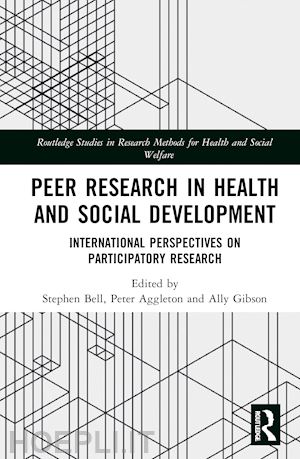Part I- Critical Perspectives on Peer Research Chapter 1- Peer research in health and social development: understandings, strengths and limitations Stephen Bell, Peter Aggleton and Ally Gibson Chapter 2- From the researched to the researcher: decolonising research praxis in Papua New Guinea Angela Kelly-Hanku, Agnes Mek, Nalisa Neuendorf, Sophie Ase, Richard Nake Trumb on behalf of the Social and Behavioural Research Team, Sexual and Reproductive Health Unit, PNG Institute of Medical Research Chapter 3- Principled tensions when working with peer researchers: community-based participatory research with five Pacific Islander communities in Southern California Brian Hui, Anthony S. DiStefano, and 'Alisi Tulua Chapter 4- The limits of peer research? Reflecting on analytic challenges during health and social development programme research in Rwanda, Nepal, Ecuador and Uganda Ruth Edmonds Part II- Working with hard to reach participants Chapter 5- People with dementia as peer researchers: understanding possibilities and challenges Linda Birt and Fiona Poland Chapter 6- Gender diverse equality and wellbeing in Manipur, North East India: reflections on peer-led research Paul Boyce, Pawan Dhall, Santa Khurai, Oinam Yambung, Bonita Pebam and Randhoni Lairikyengbami Chapter 7- Co-constructing knowledge about the wellbeing outcomes of unaccompanied migrant children becoming ‘adult’ Semhar Haile, Habib Rezaie, Winta Tewoderos, Gul Zada, Elaine Chase, Francesca Meloni and Jennifer Allsopp Chapter 8- Participation and power: engaging peer researchers in preventing gender-based violence in the Peruvian Amazon Geordan Shannon and Jenevieve Mannell Part III- Understanding diverse issues Chapter 9- Participatory visual research exploring gender and water in Cameroon: a workshop model Jennifer A. Thompson Chapter 10 - ‘I am the bridge’: peer research with women with disabilities in the Philippines and Australia Liz Gill-Atkinson, Georgia Katsikis, Rowena B Rivera and Cathy Vaughan Chapter 11- Reflecting on the role of peer researchers in collaborative Indigenous food security research in the Inuvialuit Settlement Region, Canada Tiff-Annie Kenny, Sonia D. Wesche and Jullian MacLean Part IV- Ethical considerations Chapter 12- Socio-ethical considerations in peer research with newly arrived migrant and refugee young people in Denmark: reflections from a peer researcher Nina Langer Primdahl, Alaa Nached and Morten Skovdal Chapter 13- The ethical dilemmas of working safely with community researchers: lessons from community-based research with lesbian, gay, bisexual, transgender and queer communities Ashley Lacombe-Duncan and Carmen H. Logie Chapter 14- Blurred lines: treading the path between ‘research’ and ‘social intervention’ with peer researchers and participants in a study about youth health in South Africa Rebecca Hodes Part V- Influencing policy and practice Chapter 15- Farmer-led change: addressing environmental and health problems caused by widespread pesticide use in Costa Rica, Nicaragua and Honduras Laura Sims Chapter 16- Using empowering methods to research empowerment? Peer research by girls and young women in Kinshasa, Democratic Republic of Congo Lyndsay McLean, Triphène Mpongo, Suzanne-Melissa Sumaili, Naomie Tshiyamba Kabangele Chapter 17- Lessons learned from Australian case studies of sex workers engaged in academic research about sex worker health, wellbeing and structural impediments Roanna Lobo, Kahlia McCausland, Julie Bates, Linda Selvey, Jesse Jones, Elena Jeffreys, Judith Dean and Lisa Fitzgerald Chapter 18- The lasting impact of peer research with Indigenous communities of Guyana, South America Jayalaxshmi Mistry, Andrea Berardi, Elisa Bignante, Deirdre Jafferally, Claudia Nuzzo, Grace Albert, Rebecca Xavier, Bernie Robertson, Lakeram Haynes and Ryan Benjamin











